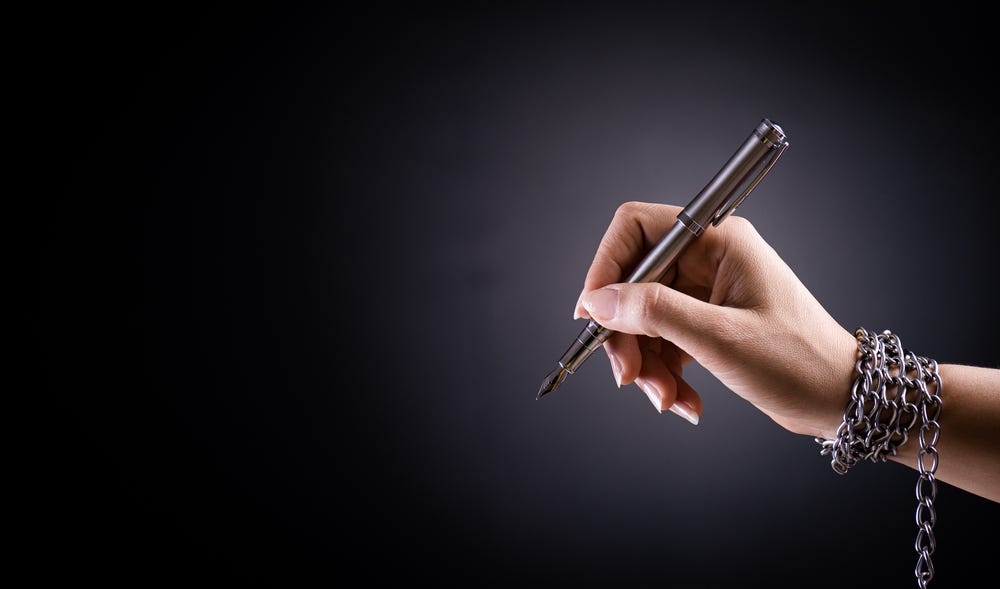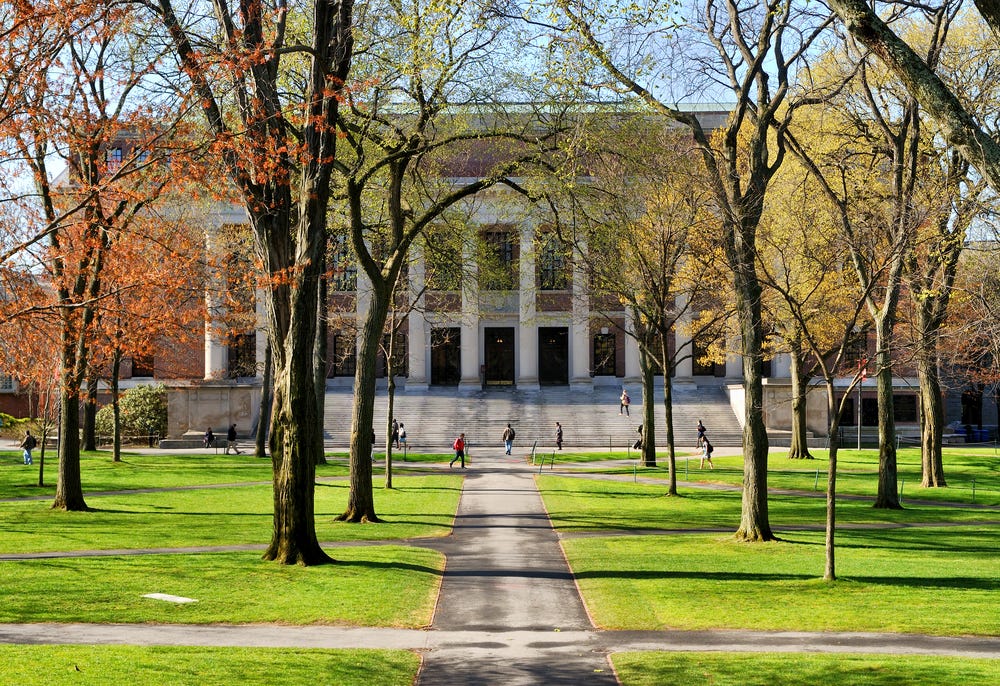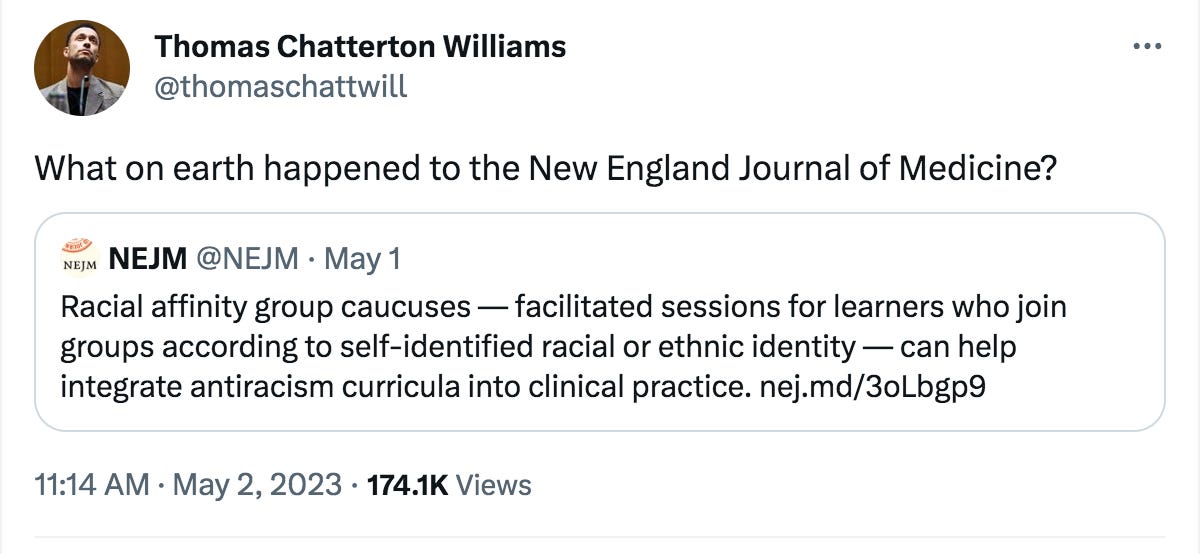E-Pluribus | May 2, 2023
We've nothing to fear but fear of cancel culture itself; college campus, heal thyself; and keeping the faith (of liberalism.)
A round-up of the latest and best writing and musings on the rise of illiberalism in the public discourse:
Matthew Yglesias: More Courage, Less Fear
Matt Yglesias can be somewhat of a contrarian on the impact of cancel culture despite his own acknowledged brush with it at Vox a few years ago, a site he helped establish. But Yglesias says hyperbole is often the currency of the cancel culture debate, and while the phenomenon is real, the focus should remain on how it is often overcome and can even redound to the benefit of those who are targets.
…I saw The Free Press celebrating a Joe Rogan clip where he quotes Bari Weiss saying “When you’re not able to say out loud and in public that there are differences between men and women, the world has gone mad. When we’re not allowed to acknowledge that rioting is rioting and it is bad, and that silence is not violence, but violence is violence, the world has gone mad.”
I do get where she’s coming from.
At the same time, she said it on CNN. It was quoted, approvingly, on what I believe is the most popular podcast in the world. Weiss decided she didn’t enjoy being an embattled ideological minority at the New York Times, and she now runs an extremely successful publication. I know what Weiss is talking about because I also had moments when I felt like the world had gone mad and got into hot water at work for saying so. But the result is I now also make way more money than I used to, I have a good side gig as a columnist for a reputable news organization, and contrary to my fears when I first struck out as a Substacker, I still generally have my emails answered by people in politics and government.
[ . . . ]
But while exaggeration is useful for certain polemical purposes, fundraising, subscriptions, marketing, or heck, just having fun blowing off steam, it’s not actually helpful for the concrete purpose of creating a more open environment for scholarship and journalism. Bullies try to create a climate of fear, and telling everyone how bad and scary the bullies are is a way of positioning yourself as opposed to them while in practice reinforcing their power. In my experience, the average Biden-voting journalist has several heterodox views he or she is keeping under his or her hat out of an all-around desire to avoid contentiousness. But my belief is that giving in to that desire is actually a form of career self-sabotage, and the people in this situation would be better off being a bit bolder. And that’s what I tell people, encouraging them to do the work rather than endorsing their worst fears.
So I wish the anti-cancellers would chill out a bit, do a bit more helping and a bit less warning, and also try to be more precise and accurate in the claims that they are making.
Read it all here.
John Avlon: The Welcome Pushback against Campus Wokeness — Coming from Colleges Themselves
Florida’s governor Ron DeSantis and state officials across the country are getting a lot of press for steps they are taking to get the “woke” out of higher education. At CNN, John Avlon cheers the trend he sees among colleges and universities in perceiving the problems on their own and taking steps to restore and maintain an atmosphere of academic freedom and free expression.
Consistent application of liberal values provides the off-ramp from escalation that we need right now. It is a challenge to be met less by politicians and more in the cultural arena where it lives. The University of Chicago started this principled pushback with a definitive commitment to freedom of expression in 2014, since signed on to by nearly 100 leading colleges and universities.
In Cambridge, Mass., Pinker, Madras and 90 of their colleagues in March founded the Academic Freedom Council at Harvard, dedicated to “intellectual diversity, and civil discourse.” In a press release last week, the group said it plans to “organize workshops, invite lecturers, and teach courses. When necessary, we will also hold the university accountable so that it lives up to its stated principles.”
But it’s not only academic institutions that are stepping up. The controversial “Harpers’ Letter” in 2020 cosigned by more than 150 prominent journalists and authors was another milestone in the effort to break the fever. It attracted an intensely negative response from figures on the far left despite defending previously uncontroversial principles of liberal values, such as the statement, “The way to defeat bad ideas is by exposure, argument, and persuasion, not by trying to silence or wish them away.”
Read it all.
ICYMI: Ben Klutsey and Joshua Cherniss: Cultivating an Ethos of Tempered Liberalism
In a February round-up, we featured an excerpt from a conversation between Ben Klutsey, director of the Program on Pluralism and Civil Exchange at the Mercatus Center at George Mason University, and Joshua Cherniss, associate professor of government at Georgetown University. Today we’re highlighting another of the topics they discussed: our present society’s loss of faith in liberalism along the whole political spectrum.
CHERNISS: I do think that we are feeling, perhaps not to the same degree as in the mid-20th century, but certainly to a great degree, a loss of faith in liberalism or in liberal democracy. I think that is a loss of faith in three ways, at least. One, which I’ve already referred to, is in terms of historical consciousness. That earlier forms of liberalism—if you look at the liberalism that was widespread and seemed fairly healthy at the beginning of the 20th century—earlier forms of liberalism offered a certain amount of historical optimism. They offered a narrative of steady, maybe not uninterrupted, but still cumulative historical progress to better and better forms of social organization, better and better economic arrangements, better and better education and enlightenment. Following World War I and the Great Depression, there was a loss of faith in that liberal historical optimism.
There was also, connected to that, a loss of faith in liberalism’s ability to solve practical problems. Again, the Great Depression is a major part of this. The sense that old-fashioned laissez-faire could not offer solutions to economic problems, that a radical rethinking of the governance of the economy was needed to prevent or overcome disaster. Also, that liberalism’s emphasis on negotiation, treaties, constitutions had also failed; that international organizations or treaties had fallen apart; that countries that had adopted liberal constitutions in the wake of World War I had all fallen into civil war and/or dictatorship.
[ . . . ]
To the extent that some simplified version of liberal triumphalism was bought into at the end of the Cold War, the fact that things have not all gone according to plan has again led to deep disillusionment. And, in some cases, real pessimism, a loss of hope or confidence in liberal institutions, a loss of confidence in liberal institutions’ ability to deal with problems, as things like the EU have fallen apart or undergone severe tests. The international community, in general, has had a hard time coordinating and responding to problems. And certain policies associated with liberalism, particularly the economic program associated with neoliberalism, have been widely discredited in many people’s eyes.
There is also this ethical dimension, the fact that critics of liberalism, people presenting alternatives to liberalism, have not been focusing just on, or even so much on, the institutional level or the economic policy level. They’ve really been focusing on liberalism’s ethical failing. If you look at Donald Trump, he wants to make America great again, and greatness involves a certain kind of character or attitude. It involves not only winning but being the kind of person who can win, who is strong, self-confident, completely deaf or immune to criticism or self-doubt, who can give us a really aggressive and even brutal confidence and happiness with ourselves, celebration of ourselves, embrace of even our most, it may be, primitive tendencies.
Read the whole thing.
Around Twitter
Colin Wright with an observation about “social conflicts of interest” when it comes to the credibility of scientists:
Thomas Chatterton Williams is concerned after the New England Journal of Medicine endorses “racial affinity groups” in medical “antiracism” education:
And finally, via Glenn Greenwald, it’s Google versus Lula in Brazil:











"So I wish the anti-cancellers would chill out a bit, do a bit more helping and a bit less warning, and also try to be more precise and accurate in the claims that they are making."
This is a great example of mealy-mouthed nonsense.
Translating from the original weasel-speak it reads as:
"I know that our culture and discourse have been captured by ideological zealots who demand we all praise the Emperor's New Clothes and proclaim that math is racist and women can have penises, but could we just keep our voices down and speak in a kinder tone? When someone demonizes you for wrongthink and attempts to get you fired, be the bigger person and respond calmly w precise and accurate facts [as if this has ever worked!]...Also, me and some other famous journalists are doing well, so it can't be so bad, right?"
Liberals are just congenitally incapable of confronting Leftists, they are too afraid of being accused of being conservative-adjacent, and thus will always and forever be Useful Idiots.